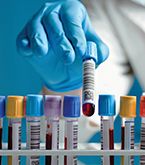×


We have detected your country as:
Please click here to go to the USA website or select another country from the dropdown list.
Its first human trials in Israel showed NeuroQuest’s test—which is based on 20 years of research by Prof. Michal Schwartz—to be 87% accurate with an 85% specificity rate in detecting Alzheimer’s. With blood tests, Budik explains, anything over 70% is considered medically significant. Encouraged by these successful results, the company went into a more aggressive mode to determine how its niche product could fit specifically into the global Alzheimer’s market.
Because the Alzheimer’s population in Israel is too small for major clinical testing, NeuroQuest brought aboard Dr. Jacobo Mintzer, chief of geriatric psychiatry and co-director of Alzheimer’s research and clinical programs at the Medical University of South Carolina (MUSC). “A clinical research organization allows the trial to be more impartial and controlled, and benefits the company because the trial is run by specialists making sure it’s safe for the patients,” explains Budik.
 angellodeco/
angellodeco/
www.shutterstock.com If the trials go as hoped, NeuroQuest could find itself in the right place at the right time. In late 2012, the US Food and Drug Administration approved Amyvid, a radioactive diagnostic agent for positron emission tomography (PET) imaging of the brain to see the density of harmful plaques in adults being evaluated for Alzheimer’s. It wasn’t possible until now to evaluate these plaques in a living patient.
However, a PET scan costs up to $6,000—meaning that Amyvid will not be widely available. Budik says that a relatively inexpensive positive blood test using NeuroQuest’s technology could provide enough cause for a health insurer to authorize the highly accurate PET imaging. So the two breakthroughs may work well together for the greater good. “We envision that in 10 to 15 years, the Alzheimer’s market will look like the cancer and heart disease market looks today,” says Budik. For more information, visit www.neuro-quest.com
All logos and trademarks in this site are property of their respective owner. All other materials are property of Bridges for Peace. Copyright © 2025.
Website Site Design by J-Town Internet Services Ltd. - Based in Jerusalem and Serving the World.